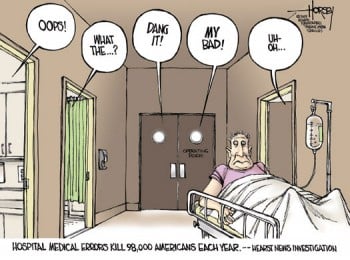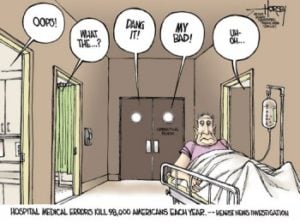
Most of you are quite familiar with the rather astounding facts regarding medical errors. There are many reasons why medical errors occur in healthcare. There are errors in omission, there are errors because of poor communication, there is the ever-present risk of human error and perhaps the ever increasing stress on physicians to see more and more patients in less and less time. There are patient-specific variables too — forgetting medication lists, etc.

Avoiding Medical Errors:
You do not want to be a statistic:
I am not here to recount or rehash the numbers. My goal is simply to apprise you of some very simple steps that you can take to try and avoid being another sad statistic.
Evan Falchuk wrote an editorial recently guiding patients on avoiding misdiagnoses. Misdiagnoses, or misinformation — once perpetuated through your medical record, or amongst your medical providers, can play a huge role in enabling a medical error to occur. Evan goes through a number of steps that you can take to minimize the risks of medical errors.
Your Role in Avoiding Medical Errors:
One of the most important steps you can take is to be as accurate as possible in filling out that annoying paperwork when you first enter a physician’s office. We all know how annoying it is to have to fill out the same paperwork, each and every time we enter a physician’s office. Unfortunately, if you are not complete and accurate in completing the paperwork, your physician may not have a complete and accurate picture of a significant portion of your past medical history. A very accurate history, including your family history, and the current and accurate list of your medications and current medical issues can be of very significant importance in determining what your current health status or disease may be. As health information exchanges and collaborative networks enable the sharing of information – that can work both to your benefit, as well as amplify the risk of harm. Bad information in… bad information out. These systems will be highly dependent on the quality of the information initially entered.
Look at Your Medical Record
Recent studies have shown that both physicians… and even patients were very receptive to this concept. This will give you a chance to verify the accuracy of the notes generated from your previous encounter … and question any comments your doctor may have added to the record.
One very important steps you to take is to ask to see your medical record, obtain copies of previous notes, and verify them for accuracy.
Assuming that your healthcare provider is beginning with a complete and accurate set of information about you, it is now very important for you to assist that provider by giving them a complete and accurate history of the issue that has brought you into their office. A symptom, or provoking factor, which may not seem important to you, may make all the difference in arriving at the proper diagnosis – – – and thus treatment plan. As a follow through, when your physician or healthcare provider is discussing their thoughts on your diagnosis, and a possible treatment plan, it is extremely important that you feel comfortable in questioning either the diagnosis or the treatment plan and asking whether other options or diagnoses are possible – and what, if any further steps are necessary to further improve the accuracy of the diagnosis and whether any treatment is necessary.
Second Medical Opinions: Not just for the physician you are seeing…
Very few patients have a problem seeking a second opinion from another surgeon or specialist. I often encourage it. Do not be afraid that your physician will feel slighted or offended. They’ll get over it. Putting another set of eyeballs on a difficult problem will frequently improve the accuracy of your diagnosis. Although many patients do in fact seek second or third opinions from a specialist, they rarely seek second opinions, if ever, on diagnostic studies. I’ve spoken about second opinions on many occasions. Radiologists are no different than the physician whose office you are currently in. Many diagnostic facilities do not have specialists who read MRIs of one particular area or subspecialty within radiology. Many diagnostic facilities will have one radiologist read all studies. That is very much like an orthopedist who will operate on a spine, shoulder, knee, and a hand on the same day. That lack of sub-specialization increases the likelihood of medical error. I will personally seek a second opinion on many patients’ MRI interpretations – If I do not agree with them. I strongly suggest, that you do the same. The very same holds true for pathology specimens. There are Pathologists who are highly sub-specialized in certain areas and thus are far better qualified to determine whether or not a tumor they’re looking at is malignant, benign, and what subtype of tumor it might be – which could make the world of difference when determining what treatments are available. This is an incredibly important yet tremendously underutilized second opinion mechanism.
Second Opinions: Use your own voice and your own words …
One significant consideration when seeking a second opinion, is that you do not want to be the source or the mechanism for perpetuating misinformation or misdiagnoses. When you seek a second opinion, you want to give that physician information that you feel is relevant and not necessarily information that you were given from the first opinion physician. Confirmation bias, or planting a seed in the ears of your second opinion physician’s mindset could simply lead to a perpetuation of a misdiagnosis and result in a wasted opportunity for a meaningful second opinion.
You MUST plan ahead for your physicians visit…
Many of you when you arrive in our offices are nervous and this can have significant ramifications on the quality of the communication that we have. Even more importantly, once we have completed the history, as well as the physical exam, we enter into a discussion about what the possible diagnoses are — and of course what the possible treatment plans are. If you have not understood the diagnosis nor some of the terms utilized when the treatment plan was discussed, then in all likelihood you are not remembering anything else the physician is saying to you.
- Bring a Friend: It is extremely important that you consider bringing someone else with you to the office to help you remember what transpired.
- Write it Down: In addition, it is aptly imperative that you bring a notepad with you to record what you’re being told.
- Keywords: Don’t be shy to ask the physician for a list of keywords or search terms so that you can go home and do your homework online to further improve your level of understanding of what was discussed. Lastly, not be afraid to ask a physician for a copy of a page that he or she may have written some diagrams or drawn out an algorithm, suggesting further treatment or diagnostic considerations.
- Ask if your physician, given the same diagnosis or treatment options would opt for the treatment they are recommending. Recent studies and anecdotal reports might surprise you.
The data and research on medical errors is quite real. Many patients are being harmed, or meaningful treatment is being delayed — on a daily basis. We all have a vested interest to change this. You can play a very significant role in minimizing the risk and to minimize your chance of being a medical statistic.














Asking to see your medical records should be repeated on at least an annual basis. Notes often go astray and, in some cases, one patient’s medical records can become mixed up with another’s. Keep your own records and do not assume, especially if you are visiting a specialist, that they will have all the important information to hand during your consultation.
If you have difficulty in understanding the complicated things some doctors say, and there is nobody you can take with you, ask the dctor to help you make simple notes. You can go over these later with the help of a friend or family member, or you can ask a nurse to help you undertand them.
If you are going in for surgery or any procedure in which you may be unable to speak for yourself, and you have any allergies or disability issues that might become relevant in a medical cotext, discuss them with the medical staff who will be treating you and make sure they listen. Don’t rely on the information being in your notes. Carrying a card with this information on it (clearly marked, e.g. with a large red cross, and easy to find) will give you some protecion if you should have an accident and be rushed in for treatment when you are unconscious.
Thanks for the comments Jennie. This is a very important topic given the large number of medical errors that occur each and every day. Patients can and should take a very active role….
Hopefully these pointers help..
Howard Luks
Great read. Patients and their advocates need to be involved. For this very reason we have our nonprofit CampaignZERO and the book, Safe and Sound in the Hospital.
Timely post. Poor communications between physicians and patients as well as poor communications between your physician and the specialist are the biggest contributors to medicaal errors amd malpractice claims.
Here are some additional suggestions for avoiding medical errors:
1) Do not assume that your doctor anf specialist have spent much time talking – ask the specialist to review with you his/her understanding of the problem…if you don’t agree correct the misunderstanding right away. It is always safer for you to assume that your care givers are not talking…and by over communicating your needs and concerns.
2) Do not assume that if something is important you will be told by the physician – often lack of time and rushing can prevent the exchange of valuable information.
3) Research shows that phsyicians tend to over estimate the amount of information 1) patient want and 2) that they as physicians actually give you. When in doubt ask!!! It’s your health…not theirs.
4) Do not assume that the medical record is correct…asuume it is not. After all have you been shown your medical record?? Have you asked to see it asd Dr. Luks suggests??
5) Call your primary care physician when you get out of the hospital and tell them you were hospitalized or had surgery. That way they know and can better follow up on existing issues. Believe it or not…it takes a while for specialists to share their notes with your doc.
Best recommendation – stay healthy and away from hospitals
Steve wilkins
http://www.healthecommunications.wordpress.com
I came across this blog while looking for materials on diagnostic error propagation in in-hospital medical records (paper). The following story from Prof L.Weed in 1989 affirms why every patient , or their carer, should have a copy of their own record. This may be in e-format or paper if there are no e-facilities.
Prof. L.WEED – PATIENT
In the latter regard, I remember the day in a medical centre on a ward with a modern information system when they wanted to present a patient to me on rounds.
I said “ Do not present a new patient: tell me who is going home today”.
The nurse volunteered the name of a middle-aged woman who had Lupus for 10 years. I suggested that they give me 15 minutes with the patient and then they could return for discussion.
I asked the patient to tell me all about each of her problems. She knew very little about the medical problems.
“ Do you have a copy of your own medical record?”
“No”
“ Are all your medications in your bedside stand, and does the nurse come around at regular intervals to see if you are taking the right ones at the right time?”
“No. The nurse just comes with little paper cups with pills in them, and I swallow whatever is there.”
“ Do you know what a flow sheet is – what parameters we are trying to follow – what end points we are trying to reach?”
“No.”
At this point I called the staff back together and told them what I had found. Their reactions were:
“ We never give patients their records.”
“ We do not have time to give the medicines that way.”
“ It would not be safe to leave them her with them unattended- she is on many powerful drugs.”
“ The patient is not very well educated and I do not think she could do all the things your questions imply.”
I then said:
“ But you said she is going home this afternoon. She lives alone. At 2 PM you will put her in a wheelchair, give her a paper bag full of drugs, and send her out the door. Are you going home with her?”
“ No. Is her management at home our problem?”
“ You just said she could not handle it – who will do it?”
“ The patient may not seem well educated or very bright to you, but what could be more unintelligent than what we are doing?”
We must think of the whole information system, and not just infinitely elaborate on the parts that interests us or fit into a given specialty. Patients do not specialize, and they or their families are in charge of all the relevant variables 24 hours a day, every day. They must be given the right tools to work with. They are the most neglected source of better quality and savings in the whole health care system. After all:
1. They are highly motivated, and if they are not, nothing works in the long run anyway.
2. They do not charge. They even pay to help.
3. There is one for every member of the population.”